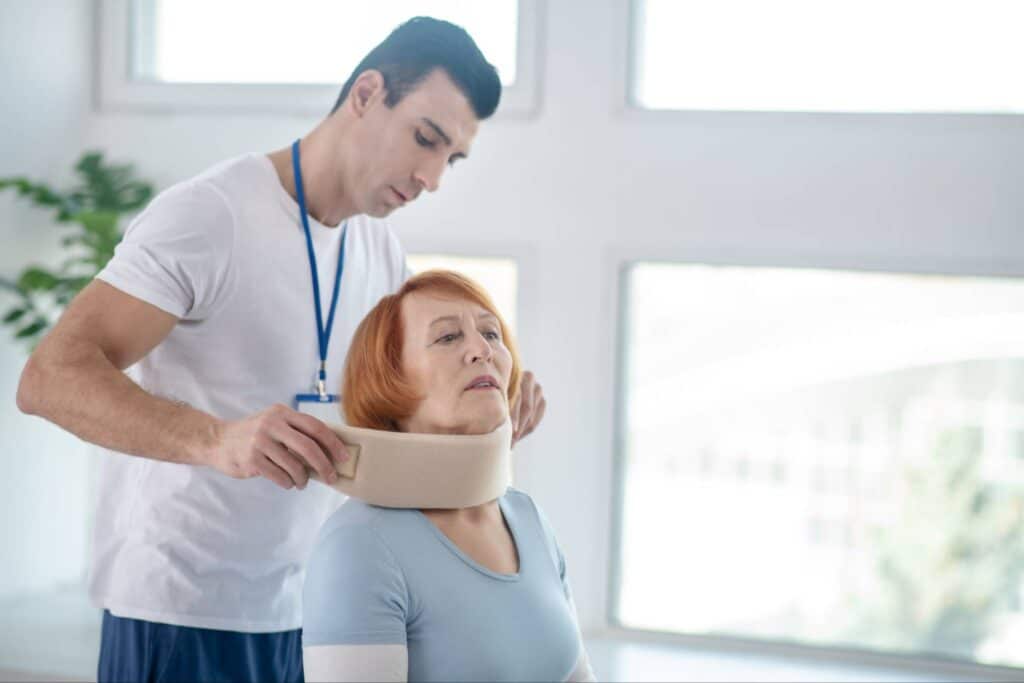Any injury to your skull, scalp, or brain is considered a head injury, and these types of injuries can range from mild to severe. If you bump your head on an overhead kitchen cabinet, you may end up with a bruise and knot on your head for a few days. If you get into a car accident, you might hit your head on the window or dashboard and end up with a cut and concussion. Some head injuries are quite common, like small bumps, scrapes, and bruises. Other head injuries can be much more serious and have significant consequences. When it comes to dealing with a head injury, it is always better to be safe than sorry. You should always take a head injury seriously and visit your trusted doctors at AICA Orthopedics near you to get your head injury checked out by professionals.
Common Causes of Head Injuries
The two most common examples of head injury causes involve either a blow to the head or violent shaking of the head. Whether you hit your head or get jostled around violently, both could lead to a head injury. Here are three common causes of head injuries and what to expect:
Car Accidents
Car accidents cause many head injuries each year. People suffer head injuries from hitting their head against parts of the car like the window, steering wheel, or dashboard. You can also suffer a head injury from the force of impact on your vehicle that causes you to jolt and jostle around. Whiplash, the most common car accident injury, involves a violent forward and backward motion of your head and neck. This can also lead to a head injury like a concussion along with a whiplash injury.
Falls
Falls can happen to anyone and are especially common among older aged adults. As you age, you can start to lose some of your stability and balance, which can put you at greater risk for falls. A slip and fall injury can also occur in the workplace or on a slippery sidewalk. If you fall and bump your head, it might not seem like a big deal at first, but it is best to get checked out by a doctor.
Sports Injuries
Sports injuries can also lead to head injuries like concussions and traumatic brain injuries. Contact sports like football, hockey, basketball, and soccer have increased their protocols for managing and preventing sports injuries like concussions and other head injuries with an increased focus on safety. However, you can even get a head injury while playing a friendly game in your backyard. If you suffer a blow to the head during a sports-related accident, you may want to get assessed by a doctor.
Symptoms of a Head Injury
Symptoms of a head injury can impact your physical, cognitive, and emotional well-being. Depending on the type and severity of your head injury, here are some examples of symptoms you may experience:
Headaches
Headaches are one of the most common symptoms of a head injury. Whether you are dealing with whiplash or not, headaches after a car accident can also be a sign of a head injury. Headaches from a head injury may include pain at the site where the blow occurred or headaches that start at the base of your skull. Headaches may feel dull and throbbing or sharp and stabbing. During assessment for a car accident injury like whiplash, your doctor may run tests to rule out a head injury.
Dizziness & Poor Balance
A head injury can cause dizziness and poor balance. Immediately after you hit your head, you may feel disoriented and lightheaded, which can impact your stability. If dizziness continues, you may feel unsteady on your feet and have difficulty balancing. A head injury that impacts the brain can affect motor skills and lead to issues with balance for a few minutes, days, or even longer.
Sensitivity to Light & Sound
A head injury can also cause a heightened sensitivity to light or sound. Immediately after a blow to the head, you may find that sounds around you seem amplified and much louder than normal. You may also find it painful to be under bright lights or outside in the sunshine after a head injury. Sensitivity to light and sound and other sensory issues can also develop in the hours or days after a head injury.
Loss of Consciousness
In some cases, a head injury can lead to a loss of consciousness. A mild to moderate traumatic brain injury could result in a temporary loss of consciousness, anywhere from seconds to a few minutes. For a severe traumatic brain injury, you could lose consciousness for hours to days at a time. If you suffered a loss of consciousness and someone was nearby, it helps to inform the doctor how long you were out of consciousness as this can help determine the severity of your head injury.
Open vs. Closed Head Injuries
Head injuries will also be labeled as open or closed. A closed head injury refers to a bump or bruise on the head that doesn’t break the skin. An open head injury means that the skin was broken and you suffered a scrape, cut, or other types of intrusion. Another term for an open head injury is a penetrating head injury, which means that something broke the scalp and skull and was able to enter your brain. While open head injuries might sound more serious, a closed head injury can be just as severe depending on the type of damage that occurs. Even if you don’t notice any bleeding, you could still be dealing with a traumatic brain injury.
Severity of Head Injuries
Head injuries are typically categorized in levels of severity: mild, moderate, and severe. Here is what you need to know about each level of severity:
Minor
Examples of minor head injuries include light bumps, bruises, and scrapes that break the skin but not the skull. Children may slip and fall on the playground and end up with a small bump or bruise on their head, sometimes known as a “goose egg.”
Mild
A concussion is considered a mild form of traumatic brain injury. A mild head injury can occur when a blow to the head or sudden jostling causes the brain to collide with the skull. This can lead to bruising or bleeding in the brain. Symptoms of a mild brain injury can include dizziness, nausea, vomiting, lethargy, and memory loss. A mild brain injury may or may not include any loss of consciousness.
Moderate
A more serious concussion could also be considered a moderate head injury. With a moderate head injury, symptoms typically involve a loss of consciousness for up to 24 hours and signs of brain trauma. Those signs may include extreme headaches, dizziness, disorientation, and extreme sensitivity to light and sound. A skull fracture refers to a break in the thick bone known as the skull that protects your brain. A skull fracture can also be a moderate head injury if the fracture does not damage the brain.
Severe
A severe head injury can result in serious disability or even death. If you or a loved one suffer a severe head injury, they may experience a long period of time unconscious or even a coma. Severe head injuries can have lasting effects on your physical, cognitive, and emotional health.
When a Head Injury Requires Medical Attention
You should never take a head injury lightly. If you are concerned about any symptoms or lingering effects of a blow to the head, see your doctor right away. You should always seek medical attention if you suffer a head injury and notice any of the following symptoms:
- Loss of consciousness
- Confusion or Disorientation
- Leaking of clear fluid from the ear or nose
Call 911 or visit an emergency room near you as soon as you can after the injury occurs. If you start to notice these symptoms in the hours or days after the injury, you can still seek emergency medical attention. Movement can sometimes make your symptoms worse and may even negatively impact the head injury. If you are concerned about a head injury, spine injury, or other serious injuries, wait for first responders to attend the scene because they have the training to move an injured person carefully without causing more damage.
Diagnosis and Treatment of Head Injuries
 If you suffered a blow to the head or violent jostling, visit AICA Orthopedics near you. Our team of doctors works with car accident victims, athletes, and people of all ages who have suffered a head injury. When you visit an AICA clinic near you, our doctors have access to state-of-the-art diagnostic imaging tools and tests necessary to assess your head injury and determine the appropriate diagnosis. They will then provide you with an individualized treatment plan to help you heal and recover. AICA Orthopedics has 20 locations across the metro Atlanta area. Visit us online to find a location near you and get started with prompt treatment for a head injury today.
If you suffered a blow to the head or violent jostling, visit AICA Orthopedics near you. Our team of doctors works with car accident victims, athletes, and people of all ages who have suffered a head injury. When you visit an AICA clinic near you, our doctors have access to state-of-the-art diagnostic imaging tools and tests necessary to assess your head injury and determine the appropriate diagnosis. They will then provide you with an individualized treatment plan to help you heal and recover. AICA Orthopedics has 20 locations across the metro Atlanta area. Visit us online to find a location near you and get started with prompt treatment for a head injury today.








